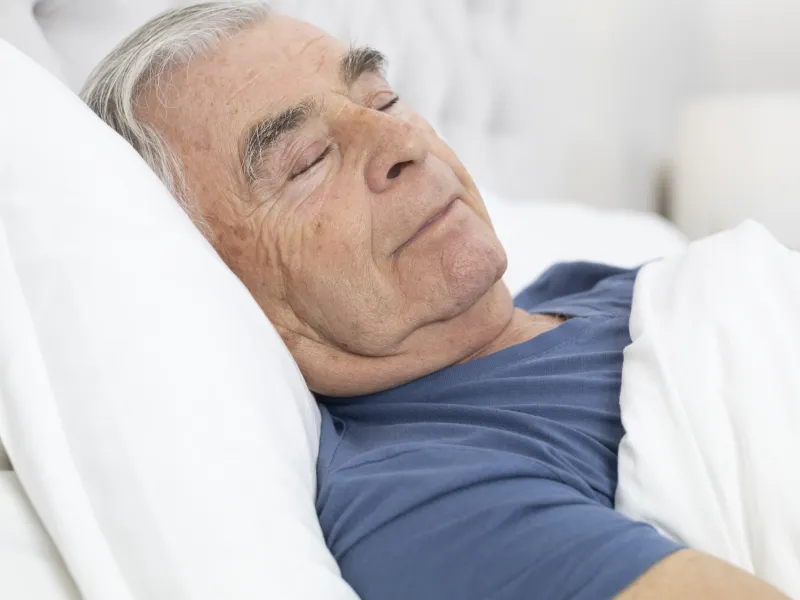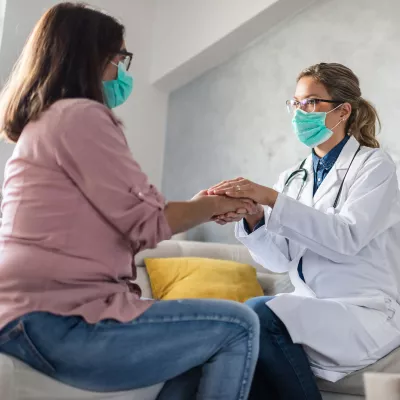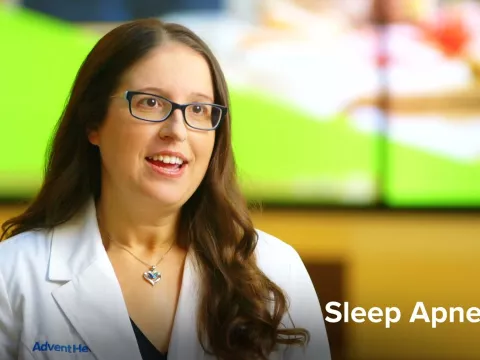
Helping You Get the Rest You Deserve
You need a good night’s sleep to feel your best. And when you have trouble sleeping, it can affect every aspect of your day, from your mood to your relationships and your overall well-being. But the good news is that most sleep disorders are easily treatable, and we’re here to help.
Whether you have trouble staying asleep or face a sleep condition like narcolepsy, our dedicated team can offer the guidance you need and the solutions that work. We serve the region with the expertise that gives you answers and the leading-edge minimally invasive surgery options that offer long-lasting relief.
Sleep Specialists Where You Need Them
-
Sleep Care Leaders
Our sleep specialists undergo years of rigorous education and advance beyond standard degrees, earning national accreditation so we can offer you the best sleep care in the region.
-
You Rest While We Work
If you’re a qualified candidate, our specialists will invite you for a sleep study that monitors how deeply you sleep and other factors that interfere with your full night of rest.
-
Your Connected Network of Experts
With a multidisciplinary team of experts from multiple specialties, we can reach you where you are — all while communicating your needs with our colleagues across our integrated system.
What to Know About Sleep Disorders
- Types of Sleep Disorders
-
Sleep conditions can vary from abnormal sleep habits to hallucinations, and even physical ailments like severe cases of blocked airways. The three main types of sleep disorders are:
Narcolepsy
This happens when your brain lacks a hormone called orexin that helps you stay awake. If you have narcolepsy, you may experience frequent or sudden — and intense — sleepiness. You may struggle to concentrate or even lose control of consciousness and, in some cases, you may experience hallucinations.
Restless Legs Syndrome
This is a movement disorder that causes discomfort, tingling or pain in your legs, often at night. Certain conditions like diabetes, Parkinson’s disease, and rheumatoid arthritis increase the likelihood of developing this condition.
Sleep Apnea
Sleep apnea is a condition that makes breathing difficult, or even dangerous, while you sleep — and it’s usually related to excess weight. If you have sleep apnea, you may snore and experience symptoms like headache, sore throat, memory loss and inability to focus.
The two main types of sleep apnea are:
- Central sleep apnea, which happens when signals from your brain don’t communicate properly with your breathing muscles
- Obstructive sleep apnea (OSA), which happens when the airway that connects your nose to your lungs becomes blocked
- Diagnosing Sleep Disorders
-
Although sleep disorders are disruptive, they can often be easily remedied. To help your care team better understand your specific sleep condition and why you have it, we may track your sleep patterns by recording your nighttime sleep activities in a journal, observing you in a sleep study or testing for abnormal genes or levels of sleep chemicals in your body.
- Sleep Disorder Treatments
-
From maintaining a healthy diet and exercise routine to nap therapy and prescription medication, we have several treatment options to help you manage daytime sleepiness and reduce symptoms of sleep paralysis and hallucinations.
Devices to Help You Sleep Better
In some cases, you may be fitted for devices that assist with sleep, like a continuous positive airway pressure device (CPAP), an air-producing mask-like tool that adjusts to your face and supports oxygen while you sleep. Or, custom oral appliances, devices molded to the inside of your mouth so that airway can flow continuously, may work better for you.
For more advanced conditions, your sleep apnea specialist may recommend surgery, including one or more of the following:
Genioglossus Advancement Surgery
This is often used for treating obstructive sleep apnea. This procedure involves your surgeon repositioning your tongue by moving it forward, so it no longer obstructs your airway as you sleep.
Hyoid Suspension
If you have a problem with your hyoid bone (the U-shaped neck bone that holds your tongue in place), your tongue may block your airway during sleep. Hyoid suspension is a minimally invasive surgery that stabilizes your hyoid bone by pulling it forward through a small incision in your neck.
Inspire® Upper Airway Stimulation Therapy
When nighttime mask-like devices like a CPAP aren’t as effective as you’d hoped, your sleep specialist may recommend a minimally invasive procedure called Inspire® Upper Airway Stimulation Therapy. During this procedure, your doctor will insert a device into your neck, under your skin, that will give you better control of your breathing patterns.
Transoral Robotic Surgery (TORS)
The TORS procedure is designed to help you maintain steady airflow. Your surgeon does this by reducing the size of your tongue through a minimally invasive endoscopic procedure.
Understanding Your Sleep Study
- Being Proactive Can Help You Stay Active
- Evaluating Your Need for a Sleep Study
- How a Sleep Study Works
- Preparing for Your Sleep Study
Sleep deprivation can vary from minor to severe and, in some cases, can lead to serious health issues like depression, diabetes and heart disease. Your sleep specialist can recommend non-surgical solutions and resources to get better sleep, including:
- Creating a regular exercise plan
- Encouraging you to limit alcohol, big meals and caffeine
- Sharing relaxation strategies to try before bed
To help us determine whether a sleep study is right for you, please take the Epworth Sleepiness Scale survey. Your responses will help us evaluate your sleep struggles to understand which, if any, sleep disorder you face to determine the best treatment options for you.
If you qualify for a sleep study, our experts will invite you to spend a night in our care, so we can observe and evaluate ways you can improve your rest.
By attaching sophisticated technology like sensors to your body and fitting you with an elastic belt that measures your breathing, our team can study your functions and breathing from an outside room, so we can pinpoint what’s causing your sleep issues.
The information you provide helps us determine which treatments are best for you. Once forms are provided to you by our team, please complete and bring the forms with you to your sleep study.
Dr. Wittine Explains Sleep Apnea

An Ally for Your Sleep Journey
Your care team will advocate for you, from your initial diagnosis to your ongoing recovery. Our care teams are specially trained in all aspects of sleep care, so they can mentor you and be your compass.


